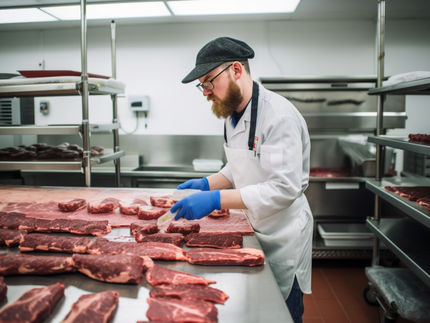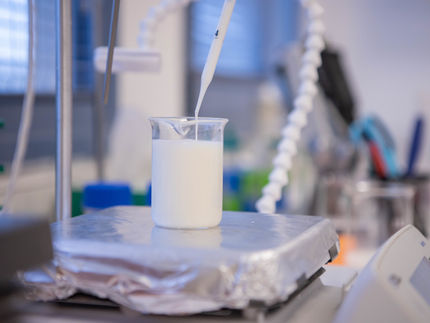Scientists awarded $5 million to boost research into alternative meats
Despite booming commercial interest in alternative meat and the huge climate mitigation potential it offers, funding for academic research lags
Advertisement
Nonprofit The Good Food Institute (GFI) has awarded $5 million in grant funds to 22 leading scientists from around the world, whose research will address the scientific barriers to producing thick, structured, three-dimensional meat made from plants, cultivated from cells, or derived via fermentation. This catalytic open-access research is designed to help alternative meats break into the vast whole-cut meat category.

Scientists awarded $5 million to boost research into alternative meats — a powerful and scalable climate solution
The Good Food Institute
The grants announced today bring GFI’s total funding for open-access alternative meat research around the world to more than $13 million over three years, making GFI the largest funder of open-access alternative meat research in North America.
Funded thanks to gifts from visionary donors, GFI’s Competitive Research Grant Program supports open-access research that addresses the biggest scientific bottlenecks facing alternative meats. Each of the 22 grantees will receive up to $250,000 over two years — 13 will focus on cultivated meat, seven will focus on plant-based meat, and two will focus on meat made via fermentation.
As scientists call for rapid changes to decarbonize the food system, alternative meat and other alternative proteins have been recognized as a powerful and scalable solution. They cause up to 92% less global warming than conventional meat production,* which is responsible for 57% of the 34% of adverse climate impact attributable to the current food system. These reductions are essential to keeping global warming below 1.5 C relative to pre-industrial levels.
But despite the climate mitigation potential, funding of academic research has lagged and is critically needed to bring alternative proteins to market at scale. Public investment for alternative protein research and development (R&D) was just $55 million in 2020, which brings the all-time public investment total to $112 million. By comparison, public investment for clean energy R&D in 2020 was $27 billion, which is 490 times the public investment for alternative protein R&D in 2020 and 241 times the total public funds ever invested in the space.
Private investments in alternative proteins reached $3.1 billion in 2020, and yet public investment in the same year was barely 1% of that, which is minuscule and disproportionate to the climate solution alternative proteins offer. Today, the influx of public dollars into clean energy technologies is helping the sector achieve efficiencies, lower costs, and increase accessibility and affordability. Increased public investment in alternative protein R&D can have a similar effect, achieving synergies with private R&D that can significantly accelerate scientific and social progress.
GFI’s Competitive Research Grant Program is designed to address this public investment shortfall, catalyze scientific discovery, and build a strong open-access research environment to foster alternative meat innovation. Since its inception in 2019, the program has awarded funding to 70 open-access research initiatives from 16 countries: Australia, Brazil, Canada, China, Denmark, Estonia, India, Israel, the Netherlands, Norway, Portugal, Serbia, Singapore, Switzerland, the United Kingdom, and the United States.
GFI grantees have made significant progress in their research over the past 12-24 months, with five projects successfully completed in 2021. See key research updates below or here. Read more about GFI’s work to increase public investment in alternative protein R&D here.
GFI grantee Dr. David McClements, University of Massachusetts: “There is an urgent need for increased federal funding directed towards the development of the next generation of alternative proteins. The development of nutritious and sustainable meat, seafood, milk, and egg analogs that can help address the rise in diet-related chronic diseases and adverse effects of global warming requires a fundamental understanding of the science behind these compositionally and structurally complex materials. Improved knowledge in this area would enable the industry to create higher-quality products that consumers could easily incorporate into their existing diets, thereby facilitating the transition to a healthier and more sustainable food supply.”
GFI Associate Director of Science and Technology Erin Rees Clayton: “The full potential of alternative proteins to drive down emissions depends heavily on continued research to answer the many remaining fundamental questions. We must invest in research and development now. Addressing the biggest scientific white spaces by building a robust foundation of open-access data will enable the entire sector to advance more efficiently.”
GFI Founder and President Bruce Friedrich: “Cutting emissions from food production is crucial to limiting climate change, and alternative proteins are the sleeper solution that can create the rapid change we need to meet this moment. Alternative proteins are the one food-based climate solution that scales and, with government support, can decarbonize global food production. Governments should invest significantly and now in alternative proteins as a key part of climate strategy that simultaneously addresses the increasing risk of pandemics, antibiotic resistance, and food insecurity.”
































































